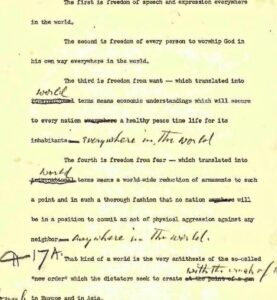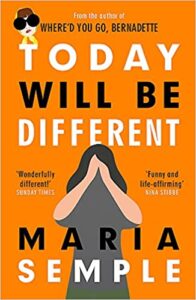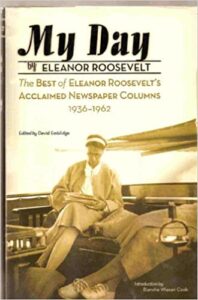My Day
Saturday, March 26th, 2022
March 26, 2022From historian Michael Beschloss:
FDR gave “Four Freedoms” speech to Congress on eve of US entry in World War II, 1941–here are his changes on the fifth draft:
Eleanor Roosevelt:
‘At all times, day by day, we have to continue fighting for freedom of religion, freedom of speech, and freedom from want—for these are the things that must be gained in peace as well as in war.’
April 15, 1943 My Day ❀
From her 1963 book, Tomorrow is Now:
‘In a sense, nearly all great civilizations that perished did so because they had crystallized, because they were incapable of adapting themselves to new conditions, new methods, new points of view. It is as though people would literally rather die than change.’
History will no doubt consider this to be his finest speech at a moment it was needed most. -dayle
President Biden:
“For God’s sake, this man cannot remain in power.”
“Their brave resistance is part of a larger fight for essential democratic principles that unite all free people. We stand with you. Period.”
Posted by Michael Marquardt, appointed by President Biden to the US Comm. Preservation of America’s Heritage Abroad:
‘Take it from this Berliner who was there when the Iron Curtain started falling in 1989, this is one of the most consequential speeches from an American president in decades. Thank you.’
Indeed.
Garry Kasparov, Chairman of the Human Rights Foundation:
‘No free world leader should hesitate to state plainly that the world would be a far better place if Putin were no longer in power in Russia. A good way to make that come about is to say exactly that. Russia will be a pariah until Putin is gone.
As I Worte today, Putin’s war in Ukraine and against the world order will not end as long as he is in power. Either the war criminal is isolated or he isn’t. No more half-measures.’
Humanity with all its fears,
with all its hopes of future years,
is hanging breathless on thy fate.
-Henry Wadsworth Longfellow
‘I don’t mean to ruin the ending for you, sweet child, but life is one long headwind. To make any kind of impact requires self-will bordering on madness. The world will be hostile, it will be suspicious of your intent, it will misinterpret you, it will inject you with doubt, it will flatter you into self-sabotage. My god, I’m making it sound so glamorous and personal! What the world is, more than anything? It’s indifferent.’
-Maria Semple, Today Will Be Different, p. 96
My Day
February 11, 2022Eleanor Roosevelt, Newspaper Columnist
Six days a week for almost three decades, the pioneering first lady explored what it’s like to be an American
When humorist Will Rogers died in a plane crash in Alaska in 1935, millions around the world mourned his passing. For V. V. McNitt, Rogers’s death was a practical as well as a personal loss. McNitt managed the McNaught Syndicate, which distributed Rogers’s highly popular column to newspapers across America. What would McNitt do now without his star writer?
Will Rogers, posing circa 1928 in front of a Curtiss Condor U.S. Mail aircraft, penned an immensely popular newspaper column until his death in a plane crash in Alaska.
—Alamy Stock Photo
He thought he’d found a replacement with Alice Roosevelt Longworth, the sharp-tongued daughter of the late President Theodore Roosevelt. In short order, her new feature, “What Alice Thinks,” was in 75 newspapers, a seemingly auspicious beginning.
Then a rival company, United Feature Syndicate, recruited First Lady Eleanor Roosevelt to compete with her cousin. Longworth’s column quickly fizzled, and ER would go on to write her column, “My Day,” six days a week for nearly 30 years.
“My Day” far outlasted Eleanor’s time in the White House, ending only with her death in 1962. The sheer frequency of “My Day,” which ran with very few interruptions during its decades of publication, also extended ER’s influence immeasurably. She would become an almost daily presence in the lives of her audience in a manner that anticipated the social-media age.
When Roosevelt’s name was floated as a possible vice-presidential running mate for President Harry Truman in 1948, she demurred. “As an elected or appointed official,” biographer David Michaelis notes, “she would have felt that any office was a demotion or a constraint. Now free to speak her mind, she was uniquely influential because her audience was listening. Through her column she could give her opinion on matters six days a week. Firmly, unscoldingly she was there each day to remind people that a powerful America was supposed to be above racism, had a responsibility to find ways to give basic decencies to the poor.”
[…]
If FDR exemplified the heroic presidency as a champion of the New Deal and wartime leader on a global stage, then his wife tended to offer an alternative vision. Her columns suggested that presidents and first ladies, for all the trappings of high office, still lead much of their lives in the lowercase. They get tired. They get sick. They sometimes don’t want to be bothered.
Time magazine, commenting on “My Day,” lauded “Mrs. Roosevelt’s ability to make the nation’s most exalted household seem like anybody else’s.”
Roosevelt maintained a high profile early in her widowhood as an official at the fledgling United Nations. She later worked as a volunteer supporter of the U.N. and in many civic and Democratic party causes.
Beyond their quaint domestic observations, her “My Day” columns could also be boldly political, especially after she returned to life as a private citizen and felt at even greater liberty to speak her mind.
Many of Roosevelt’s “My Day” columns can be read online, and they’ve also been curated in several books, such as editor David Emblidge’s My Day: The Best of Eleanor Roosevelt’s Acclaimed Newspaper Columns, 1936–1962.
They’re written with a simplicity that ER’s critics found banal and her fans found appealing. Stella Hershan, who fled Nazi-occupied Austria and arrived in the United States penniless, learned about her new country by reading “My Day.”
“Her writing was so simple, even I could understand it. From her,” Hershan said of Eleanor Roosevelt, “I learned about America.”
Of one thing I am sure: Young or old, in order to be useful we must stand for the things we feel are right, and we must work for those things wherever we find ourselves. It does very little good to believe something unless you tell your friends and associates of your beliefs. Those who fight down in the marketplace are bound to be confused every now and then. Sometimes they will be deceived, and sometimes the dirt that they touch will cling to them. But if their hearts are pure and their purposes are unswerving, they will win through to the end of their mission on earth, untarnished.
Full piece with photos: https://www.neh.gov/article/eleanor-roosevelt-newspaper-columnist





